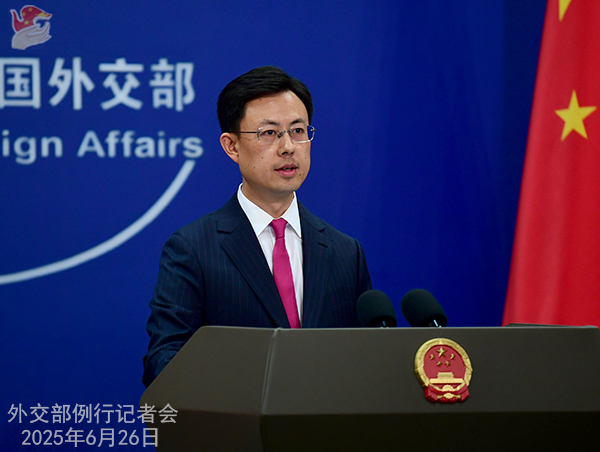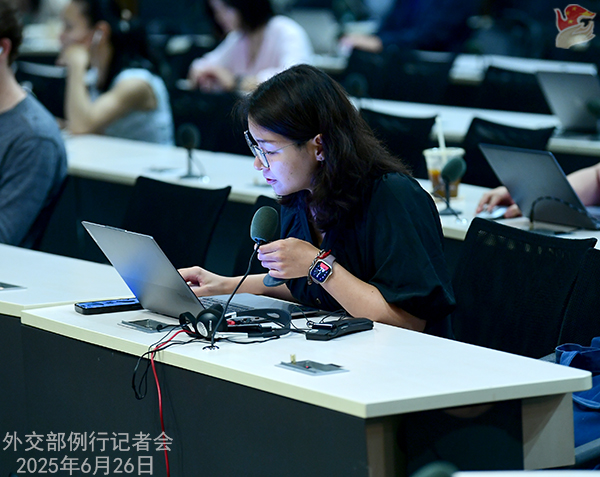
People’s Republic of China


CCTV: The 16th Annual Meeting of the New Champions just concluded in Tianjin. President and CEO of the World Economic Forum Børge Brende noted recently that we have to move back to the win-win thinking of “what is good for your economy is good for my economy” and vice versa, instead of sticking to the old mentality of “you win, I lose” or “the winner takes all.” Facing increasing instability and uncertainty in the global economic and trade environment, what role can China play for world economic development?
Guo Jiakun: The 16th Annual Meeting of the New Champions was successfully held in Tianjin. Premier Li Qiang attended and addressed the Opening Plenary, met with guests from various countries, and had a conversation with representatives of the foreign business community, demonstrating China’s confidence in achieving sustained and steady economic growth, and determination to provide impetus for world economic growth by opening up our market and integrating into the global market.
China firmly embraces a universally beneficial and inclusive economic globalization, and advocates resolving differences and disagreements through equal consultation, safeguarding common interests in mutually beneficial cooperation, and contributing to each other’s development by generating more growth. China will continue to develop itself into a major country in terms of development, consumption and innovation, and the Chinese economy, with its further development, will continue to contribute to the world economy. We warmly welcome enterprises from around the world to invest in China, deepen your roots in China, and develop alongside China. We look forward to working with all parties to do more things for the greater good, to break new grounds and for win-win results, and jointly create a better future.
CGTV: Today is the UN Charter Day. As a founding member of the UN, how does China view the historical and contemporary significance of the signing of the UN Charter?
Guo Jiakun: Eighty years ago, the signing of the UN Charter and the founding of the United Nations declared the steadfast commitment of the international community to ending the scourge of war and promoting cooperation, which ushered in a new historical chapter of countries working together for peace and development. Now, 80 years on, amidst shifting international dynamics, the purposes and principles of the UN Charter have shown everlasting relevance, becoming the fundamental guidance for handling international relations and a crucial cornerstone for the stability of the international order. On the 80th anniversary of the signing of the UN Charter, China calls upon the world to revisit the spirit of the Charter, and more importantly to always put it into action and reinvigorate it.
As the first country to put its signature on the UN Charter, China has all along strictly followed the norms governing international relations, faithfully fulfilled its international obligations, and made positive contributions to the peace and development of humanity. China stands ready to work with all sides to renew our commitment to the founding mission of the UN, observe the purposes and principles of the UN Charter, practice true multilateralism, jointly strengthen the role of the UN, improve global governance, safeguard international fairness and justice and create a better future.
Reuters: NATO chief Mark Rutte said on Wednesday that given the long-term threat of Russia, but also the massive buildup of the military in China, and the fact that North Korea, China and Iran are supporting the war effort in Ukraine, it’s really important that NATO spends more. To what extent does China agree with Rutte’s assessment of the situation?
Guo Jiakun: Relevant personnel in NATO, by playing up international and regional tensions and slandering China’s normal military buildup, seeks nothing but excuses to allow NATO to drastically grow its military spending, arbitrarily reach beyond its geographical scope and mandate, and advance eastward into the Asia-Pacific.
NATO countries already account for 55 percent of the world’s total military spending in 2024. Yet they’re still required to raise defense investment to 5 percent of GDP to build a “more lethal NATO.” What exactly is NATO’s objective behind this? NATO calls itself a regional organization, but it keeps reaching beyond the geographic scope defined in its treaty and into the Asia-Pacific by claiming that what happens there and in Euro-Atlantic are “interconnected”. The world is not blind to NATO’s calculations, and countries in the Asia-Pacific are certainly wary of it.
On Ukraine, China has all along been promoting talks for peace and actively pushing for a political settlement of the crisis. China has never provided weapons to any party to the conflict and exercised strict export control over dual-use articles. China’s objective and impartial position and constructive role have been widely recognized by the international community, while NATO’s disinformation cannot deceive people around the world. If NATO truly cares about the security of Europe and the world, it should stop adding fuel to the fire and instigating confrontation.
China acts as a builder of world peace, a contributor to global development, a defender for international order and a supplier of public good. On peace and security, China has the best track record among major countries. We call on NATO to examine its own behavior, listen to the just voice of the world and let go of its outdated Cold War mentality, bloc confrontation and zero-sum approach. Time for NATO to get its perception right about China and stop manipulating issues on China. China will firmly uphold sovereignty, security, and development interests, and continue to do its part to make the world a more peaceful and stable place.
NHK: Earlier this week, Ukrainian media reported that around 600 Chinese military personnel will be hosted at Russian bases in 2025 to study Russia’s combat experiences in Ukraine. Can you confirm whether such an arrangement between China and Russia exists?
Guo Jiakun: Regarding this, I have no information to share.




